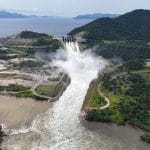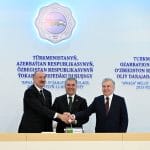Oil prices fell to three-month lows this week due to the signal from the Federal Reserve that it will start tapering stimulus measures and a slowdown of the global economy.
“The catalyst for this week’s oil price fall is the signal from the Federal Reserve that it will start tapering stimulus measures. That resulted in a rally in the US dollar, and this always has a counter-effect on the oil price,” Chris Weafer, co-founder of Macro-Advisory in Moscow, told New Europe on August 20.
“The Fed has been giving some signals since early August, hence we have seen Brent crude slide from a closing high of over $76 per barrel (set on July 30th) to Friday’s level of $65 per barrel,” he added.
According to Weafer, the dollar rally comes against a backdrop where the Organization of Petroleum Exporting Countries (OPEC) and it allies led by Russia, a group known as OPEC+, has agreed to add an additional 400,000 barrels per day to supply and concerns are growing about the economic impact of the latest rise in Covid infections around the world. “So, what was looking like a very favorable supply-demand balance in early summer is now looking like it is shifting to a possible supply surplus,” Weafer said.
“But one also needs to bear in mind that the price of Brent has rallied from under $52 per barrel at the start of this year. So the steepness of the recent price decline is almost certainly linked to some traders locking in profits in what is traditionally a quiet trading month,” the Macro-Advisory co-founder said.
According to Weafer, the key for the price in September, when traders start to look at expected trends for the next year, and to year end will be economic data and trend expectations in major economies. “If growth continues to pick up, then so too will oil demand and the price of oil will rally to $80 per barrel. If the recent spike in Covid infections leads to further lockdowns in major economies, then oil demand will fall, or not rise as fast as expected, and we could see Brent back into the $50s per barrel,” he said.
Russia best placed amongst OPEC+ countries
Asked about the impact of low oil prices on Moscow, Weafer said Russia is best placed amongst the OPEC+ countries. He noted that it has the lowest budget breakeven price requirement at under $50 per barrel and has been reporting a budget surplus for the past five straight months. As a result, its financial reserves are at a record high while total national debt is less than 18% of GDP.
“Russia’s other advantage is that it has a flexible currency while OPEC countries typically have their currencies tied to the US dollar. It means that the ruble weakens when oil falls – as it has done again this week – and that provides budget (ruble) revenue protection,” Weafer said, adding that Moscow will be a lot more relaxed about this price slide than will governments in Riyadh, Abu Dhabi and in other OPEC+ states.
Meanwhile, Justin Urquhart Stewart, co-founder of UK regional investment platform Regionally in London, told New Europe by phone on August 20 a combination of global issues from the Fed tapering issues, even Afghanistan led to the recent drop in oil prices. “The wind has gone out of the sails of the global economy and you can feel the ship lurch more slowly and losing momentum and to me that means I’d be a seller of oil at the moment,” Urquhart Stewart said.
“Take the Fed with tapering concern, take China with its concern and the definite slowdown we’re seeing there, even take the negative attitude about what’s happening in Afghanistan and the potential future political disturbance, you have three very good reasons there why people would be holding back on investments at the moment and expenditure and therefore the previous positive enthusiasm we’ve been seeing in the global economy will be losing its momentum for those reasons. Therefore it doesn’t surprise me you got a weaker oil price and it will get weaker still,” Urquhart Stewart said, adding, “The trend is still low and I think that’s going to continue. The wind has just come out of the sails of the global economy and I could see that the ship is decisively going slower”.
follow on twitter @energyinsider






